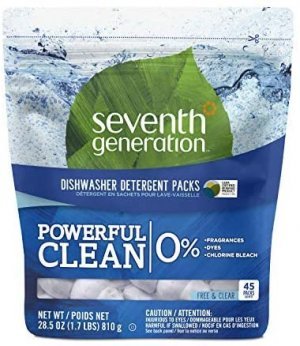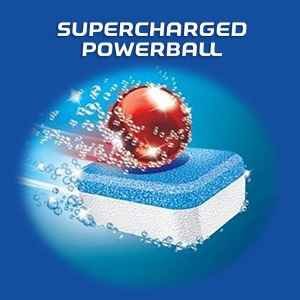Cleaning your dishes can be a laborious task, but there’s no need to make it harder on yourself. Clumping dishwasher detergent is one of the most common causes of poor dishwashing results. Luckily, there are a few simple steps you can take to keep your dishwasher detergent from clumping and ensure that your dishes come out sparkling clean!
Table of Contents
What is Clumping?
Clumping of dishwasher detergent is one of the most common problems faced by many households. Clumping occurs when moisture in the air causes solid particles to combine and form lumps, which can render the detergent ineffective. Fortunately, there are a few simple steps that you can take to keep your dishwasher detergent from clumping.
The best way to prevent clumping is by making sure that no moisture gets into the container where your detergent is stored. It’s important to seal it tightly after each use and store it in a cool, dry place away from direct sunlight or any other sources of heat or humidity. Additionally, try not to overfill your storage container with too much detergent; this will allow room for air circulation and reduce the chance of moisture getting inside.
Identifying Clumping
Clumping can be a major problem for anyone using dishwasher detergent. But, with a few helpful tips, you can ensure that your detergent will never clump together again.
First, make sure to keep the lid on your detergent container shut tightly when not in use. This will help prevent moisture from entering and causing the powder to become damp and clumpy. Additionally, if possible, store your dishwasher detergent in a cool dry place away from direct sunlight or heat sources such as radiators or ovens. This will help to protect it from any humidity which could affect its texture.
Finally, if you live in an area with very high levels of humidity it may be worth investing in a dehumidifier to reduce moisture levels and keep your dishwasher detergent fresh and free from any potential clumps.

Causes of Clumping
Clumping is a common problem with dishwasher detergent that can lead to ineffective washing. Clumping is caused when moisture or humidity enters the package, allowing the powder to absorb and form clumps. To keep your dishwasher detergent from clumping, it’s important to understand why and how it occurs in the first place.
The main cause of dishwasher detergent clumping is moisture in the air that comes into contact with the powder. When humidity or other dampness enters an unsealed or loosely closed container, it can quickly dissolve into the powder particles, causing them to stick together and form lumps. This can make it difficult for your dishwasher to properly dissolve and clean dishes effectively – leaving them dirty or streaky looking.
Solutions for Clumping
Clumping of dishwasher detergent can be an annoying issue that can lead to ineffective cleaning and leave residues on dishes. If you are having issues with clumping and want some quick solutions, look no further! We have put together a few simple tips to help you keep your dishwasher detergent from clumping up.
The first step is to store the detergent in a cool, dry place away from direct sunlight or humidity. This will ensure that it does not absorb moisture, which can lead to clumps. Additionally, you should use an air-tight container when storing the detergent so that any moisture in the environment cannot get inside. Finally, keep the lid tightly closed when not in use and make sure to always measure out only what you need for each load of dishes as too much detergent can also cause clumps.
What is an Anti-Clumping Agent?
An anti-clumping agent is a substance added to detergents, such as dishwasher detergent, to keep the powdered or granulated ingredients from clumping together. This means that when the powder comes into contact with moisture, it will not form hard lumps that are difficult to dissolve. Anti-clumping agents are used in many products including laundry detergents, dishwashing liquids and shampoos.
How Does an Anti-Clumping Agent Work?
An anti-clumping agent works by creating a barrier between different particles in the powder. This barrier prevents them from sticking together and forming clumps when exposed to moisture. Anti-clumping agents also help keep powder evenly mixed so that it can be easily dissolved in water without forming lumps or hardened chunks of detergent.
How to Keep Dishwasher Detergent from Clumping?

Having dishwasher detergent that clumps can be a real nuisance, causing you to have to manually break it apart before putting it in the dishwasher. Not only is this time consuming, but it can also lead to an uneven distribution of detergent during the washing cycle, resulting in dirty dishes. Fortunately, there are a few simple steps you can take to help ensure your dishwasher detergent stays clump-free.
Step 1: Choose the Right Detergent
Choosing the right detergent for your dishwasher can be a daunting task, but it doesn’t have to be. With a few simple steps, you can find the best detergent to keep your dishes sparkling and clean.
It is important to pick a detergent that is specifically designed for use in dishwashers as regular laundry detergents may not be suitable and could leave residue on dishes or clog up your machine. If you are looking for an eco-friendly option, there are many biodegradable products available that will do the job just as well as any other alternative.
Furthermore, it’s important to make sure that you store your dishwasher detergent properly so that it does not clump up or become solidified over time; this will ensure maximum performance from your product every time you run your dishwasher cycle!
Step 2: Check and Clean Dispenser
When it comes to keeping your dishwasher detergent from clumping, step two is all about checking and cleaning the dispenser. Clogging of the dishwasher dispenser can occur when leftover particles of detergent block the flow of water into the machine. To ensure that your dishwasher is running optimally, it’s important to check and clean out this component on a regular basis.
The first step in doing so is to remove any clumps or chunks of detergent stuck in the dispenser itself. This can be done by using an old toothbrush and some warm, soapy water to gently scrub away at these pieces. Once they have been removed, use a damp cloth filled with vinegar and baking soda solution to thoroughly rinse off any residue from where you were scrubbing.
Step 3: Store Properly
If you have noticed that your dishwasher detergent has begun to clump, there are a few simple ways to help keep it from doing so. The third step in ensuring that your detergent remains free of clumps is storing it properly. Proper storage can help extend the life of the detergent and prevent clumping from occurring.
Storing your dishwasher detergent correctly involves keeping it away from heat sources, such as ovens or direct sunlight. Additionally, make sure to keep the lid tightly closed when not in use – this will help lock in moisture and keep air out. If possible, try to store the container on a flat surface instead of upright; this will also help keep moisture out of the container. Finally, avoid storing wet sponges or any other items near your detergent box; they could add more humidity than necessary and potentially cause clumping.
Step 4: Add Water Softener
A water softener is designed to remove hard minerals from the water supply such as calcium and magnesium, which can be responsible for detergent clumping. It’s best to install a water softener before your dishwasher so that it can reduce the amount of soap scum buildup that occurs during a wash cycle.
Using a water softener will also help improve the overall performance of your dishwasher. With less mineral content in the water, detergents are better able to break down food particles and grease on dishes more effectively during each wash cycle. The result is sparkling clean dishes without any leftover residue or build-up that could cause clumping over time.
Step 5: Look for Anti-Clumping Agents
The fifth step to avoiding clumping dishwasher detergent is to look for anti-clumping agents. Anti-clumping agents are special ingredients that help keep your dishwasher detergent from getting lumpy and hard. These agents can be found in some brands of detergents, but it’s important to read the label carefully to make sure they’re included.
This will ensure that you get a consistent and effective clean each time you run a cycle in your dishwasher. When looking for an anti-clumping agent, be sure to choose one with an acidity level appropriate for your detergent – too much acidity can weaken its cleaning power and cause it to break down more quickly.
Additionally, check the label for other additives such as baking soda or lemon juice, which will help prevent clumps from forming in the first place.
Why Does my Dishwasher Leave Soap Residue on my Dishes?
There are several reasons why your dishwasher may be leaving soap residue on your dishes. Some of the most common causes include:
- Overloading the dishwasher: If you pack too many dishes into your dishwasher, it may not be able to properly clean and rinse all of them, resulting in soap residue.
- Using too much detergent: Using more detergent than is recommended by the manufacturer can leave a soap residue on your dishes.
- Improper detergent: Using non-recommended types of detergents or not using detergent specifically designed for dishwashers can lead to soap residue on dishes.
- Blocked spray arms: Food particles or debris can clog the spray arms, preventing them from rotating properly and preventing the dishes from being properly cleaned.
- Hard Water: Hard water may contain high levels of mineral deposits that can leave a film on dishes.
- Not running the rinse aid: Rinse aid is an optional dishwasher additive that helps to reduce water spots and soap scum, if not used it can contribute to the soap residue.
To fix this issue, you can try reducing the amount of detergent you use, make sure to clean the spray arms, and run a rinse cycle. Check for the water hardness and if hard water, descale your machine and try using a rinse aid. if you have tried all these and still facing the issue, you should consider checking if there’s a problem with your dishwasher such as a clogged filter or a malfunctioning water pump.

